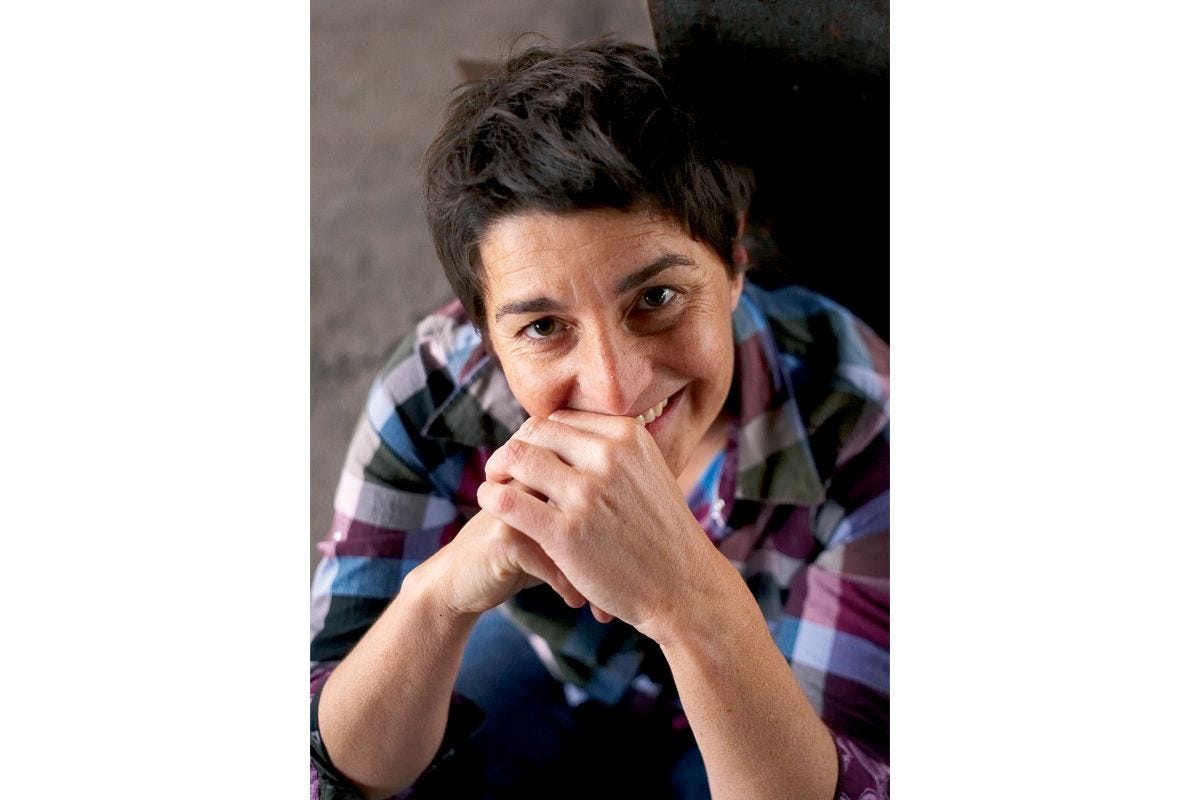A short interview with Isabelle Legeron
I talk with the creator of Raw Fair, in London.
I've just returned from a hugely enjoyable weekend spent at Rawfair, London's biggest celebration of natural wines. In the space of three years, this event has become a must in my calendar. Every year, I've made exciting discoveries and every year I leave feeling hugely optimistic about the wine industry. Raw is never boring, there's always adventure.
This year, I opted to spend a morning tasting a random selection of 50 wines with Robert Joseph. The background on why we decided to do that is here. The results of our tasting will appear in a joint article for timatkin.com in the next week or so.
In the meantime, I caught up with Rawfair's founder and natural wine guru Isabelle Legeron MW, on Sunday morning as the fair was getting underway. _____________________________
This is the third year of Rawfair. How does that make you feel?
I'm delighted, of course. But frankly, if I'd known it was going to get this big, I might not have done it
To what do you attribute the popularity of the event?
People really like the transparency and the professionalism. We ask every single one of our growers to submit lab analyses of all their wines. This year we had to kick out a few producers because once we saw the figures, they weren't within our limits. I go to all the big natural wine fairs in Europe, but we are the only ones who provide this level of transparency. It's great for consumers because they know exactly how every wine here is made, and what's in it
What about the trade?
Raw is becoming a hub for producers and importers to meet each other. We want it to be a place for business – we're increasingly seeing that importers from other countries come here to meet their producers, and to discover new wines. London's a great location from that point of view, because it's easy and cheap to get here from most other parts of Europe
Are you in favour of a natural wine “standard”, ie: certification or something legal?
I think it's going to become mandatory. How can we all agree on what constitutes a natural wine otherwise? Sometimes I taste wines from producers who claim they're making natural wines, and I really wonder how they're making them. For me, once you go beyond about 50-60 ppm of sulphur in a finished wine, some of the character is lost
In the Telegraph yesterday, Victoria Moore was asserting that wines made with low or no added sulphur have significant bottle variation. That can't be good for consumers can it?
I don't see it as a problem. People forget that wine is a living product. (looks across at the Neals Yard Dairy cheese stall) – if we buy a nice cheese from those guys, we don't expect it to taste the same every time. Why should it be any different with wine? With good growers, bottle variation isn't necessarily good/bad. One bottle may be more “closed”, another may be more “open”. It depends on what day you open the wine, so many things. It's interesting to notice the differences
I agree. I have more of an issue with inexperienced sommeliers serving a natural wine that is unintentionally oxidised, and claiming that it's OK because “it's a natural wine”.
Yes, that is an issue. We need more education there, and the restaurant trade needs more professionalism when it comes to serving these wines. I also think that natural wines are often drunk too young. Especially when it comes to wines made with no added sulphur, you really need to wait two winters [after the harvest] to let it stabilise. I'm not a winemaker, but I've observed that issues with mousiness are often present when the wine is young, and then disappear given a bit more time
You're not talking about brett[anomyces]?
No. Brett is a problem that relates to vineyard or winery hygiene, and it's certainly not exclusive to natural wines
So is it a misconception that sulphites are necessary for longevity in wine?
Yes definitely. But growers are still learning how to make wine with no added sulphur – they only get one go at it every year! Sometimes I think it's better if a grower gradually reduces the SO2 each year, rather than immediately trying to make a no-sulphur wine
You said recently that you're thinking of opening a winebar that will serve mature examples of natural wines.
Yes, we're already looking for a location. It's going to be in East London, for sure. I really want people to experience how wonderful some of these wines can be with age. They often start off very opulent, almost brash, but then over time you get more focus, more minerality. We're going to work very closely with growers when it comes to putting together the wine list, and we'll do a small amount of seasonal food to accompany things
Are you still making wine in Georgia?
No, I did one vintage and it was great, but there just isn't time. I'd have to spend at least four months of the year in Georgia to do it properly
You're a Master of Wine, but The IMW has a bit of a reputation for being traditionalist. Has being an MW helped you?
It's given me more credibility, that's for sure. And I think classical training in wine is a fantastic foundation. But actually, the IMW is changing – the new breed of MWs coming through now are much less traditional in their approach, much more open. I've been heavily involved with the IMW's education programme actually, helping to update it a bit. Ultimately if you want to change the system, you need to be in the system
Wise words. Thanks very much for your time Isabelle!


